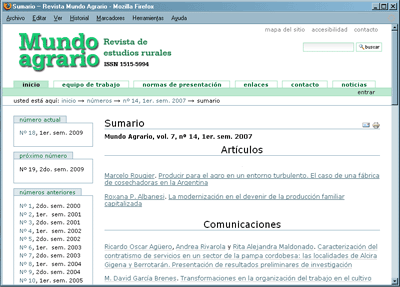Enfiteutas, propietarios, agregados y ocupantes en el "nuevo sur": los partidos de Arenales y Ayacucho (1823-1860)
Main Article Content
Abstract
This article centres on the occupation and appropriation of land in a southern area of Buenos Aires province, which was part in the first decades of the XIXth century of the so called "new south": the districts of Arenales and Ayacucho, between 1823 and 1860. We will begin characterising the giving of those territories to individuals, the impact of the different ways of that giving and the evolution of the tenancy structure. This will take us to wonder about the main characters of this process: who were the beneficiaries of this giving? How arrived them in this "new south" land? How was the conformation of the proprietary group of this area? Can we see the permanence of the same surnames through the complete period? Moreover, can we see, in this particular area as in other areas, real possibilities of occupation without legal tenancy? We will compare with other processes of occupation and appropriation of state territories, especially at the south of the Salado River , in order to have a complete vision of this case, which is obviously integrated in a more wide process.
Downloads
Download data is not yet available.
Article Details
How to Cite
D’Agostino, V. A. (2007). Enfiteutas, propietarios, agregados y ocupantes en el "nuevo sur": los partidos de Arenales y Ayacucho (1823-1860). Mundo Agrario, 7(14). Retrieved from https://www.mundoagrario.unlp.edu.ar/article/view/v07n14a07
Issue
Section
Dossier: Acceso y tenencia de la tierra en Argentina. Enfoques locales y regionales, siglos XVIII-XX
Works are released under a Creative Commons License (Creative Commons 4.0. Atribución-NoComercial-CompartirIgual) which provides unrestricted use, copy and redistribution in any medium or format and remix, transform and build upon the original work properly cited. The Creative Commons License stipulates that: "You must attribute the work in the manner specified by the author or licensor (but not in any way that suggests that they endorse you or your use of the work)."
